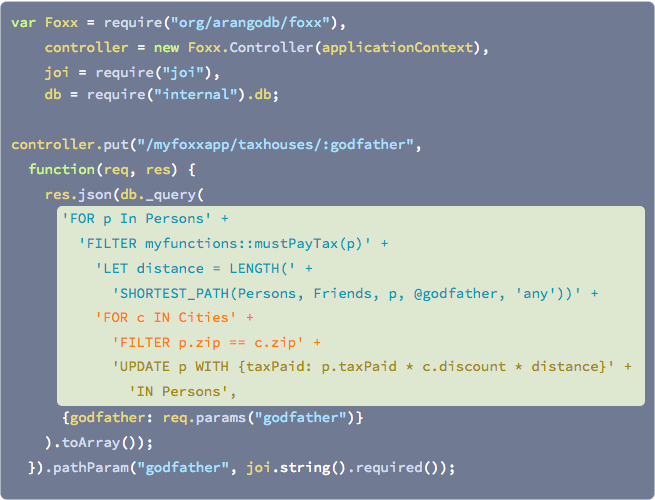|
|
||
|---|---|---|
| .hooks | ||
| 3rdParty | ||
| Documentation | ||
| Installation | ||
| UnitTests | ||
| arangod | ||
| arangosh | ||
| cmake | ||
| etc | ||
| js | ||
| lib | ||
| scripts | ||
| tests | ||
| utils | ||
| .clang-format | ||
| .ctags_exclude | ||
| .editorconfig | ||
| .gitattributes | ||
| .gitignore | ||
| .gitmodules | ||
| .jsbeautifyrc | ||
| .travis.yml | ||
| CHANGELOG | ||
| CMakeLists.txt | ||
| CONTRIBUTING.md | ||
| DEPRECATED.md | ||
| GNUmakefile | ||
| ISSUE_TEMPLATE.md | ||
| LICENSE | ||
| LICENSES-OTHER-COMPONENTS.md | ||
| README | ||
| README.md | ||
| README.windows | ||
| README_maintainers.md | ||
| VERSION | ||
| VERSIONS | ||
| asan_arangodb_suppressions.txt | ||
README.md
ArangoDB
ArangoDB is a multi-model, open-source database with flexible data models for documents, graphs, and key-values. Build high performance applications using a convenient SQL-like query language or JavaScript extensions. Use ACID transactions if you require them. Scale horizontally with a few mouse clicks.
The supported data models can be mixed in queries and allow ArangoDB to be the aggregation point for your data.
To get started, try one of our 10 minutes tutorials in your favorite programming language or try one of our ArangoDB Cookbook recipes.
For the impatient: download and install
ArangoDB. Start the server arangod and point your browser to http://127.0.0.1:8529/.
Key Features in ArangoDB
- Multi-Model: Documents, graphs and key-value pairs — model your data as you see fit for your application.
- Joins: Conveniently join what belongs together for flexible ad-hoc querying, less data redundancy.
- Transactions: Easy application development keeping your data consistent and safe. No hassle in your client.
Here is an AQL query that makes use of all those features:
Joins and transactions are key features for flexible, secure data designs, widely used in relational databases but lacking in many NoSQL products. However, there is no need to forgo them in ArangoDB. You decide how and when to use joins and strong consistency guarantees, without sacrificing performance and scalability.
Furthermore, ArangoDB offers a JavaScript framework called Foxx that is executed in the database server with direct access to the data. Build your own data-centric microservices with a few lines of code:
Microservice Example
By extending the HTTP API with user code written in JavaScript, ArangoDB can be turned into a strict schema-enforcing persistence engine.
Next step, bundle your Foxx application as a docker container and get it running in the cloud.
Other features of ArangoDB include:
- Use a data-centric microservices approach with ArangoDB Foxx and fuse your application-logic and database together for maximal throughput
- JavaScript for all: no language zoo, you can use one language from your browser to your back-end
- Flexible data modeling: model your data as combination of key-value pairs, documents or graphs - perfect for social relations
- Different storage engines: ArangoDB provides a storage engine for mostly in-memory operations and an alternative storage engine based on RocksDB which handle datasets that are much bigger than RAM.
- Powerful query language (AQL) to retrieve and modify data
- Transactions: run queries on multiple documents or collections with optional transactional consistency and isolation
- Replication and Sharding: set up the database in a master-slave configuration or spread bigger datasets across multiple servers
- Configurable durability: let the application decide if it needs more durability or more performance
- Schema-free schemata let you combine the space efficiency of MySQL with the performance power of NoSQL
- Free index choice: use the correct index for your problem, be it a skiplist or a fulltext search
- ArangoDB is multi-threaded - exploit the power of all your cores
- It is open source (Apache License 2.0)
For more in-depth information read the design goals of ArangoDB
Latest Release
Packages for all supported platforms can be downloaded from https://www.arangodb.com/download.
Please also check what's new in ArangoDB.
More Information
Please check the Installation Manual for installation and compilation instructions.
The User Manual has an introductory chapter showing the basic operations of ArangoDB.
Stay in Contact
We really appreciate feature requests and bug reports. Please use our Github issue tracker for reporting them:
https://github.com/arangodb/arangodb/issues
You can use our Google group for improvements, feature requests, comments:
https://www.arangodb.com/community
StackOverflow is great for questions about AQL, usage scenarios etc.
https://stackoverflow.com/questions/tagged/arangodb
To chat with the community and the developers we offer a Slack chat:


